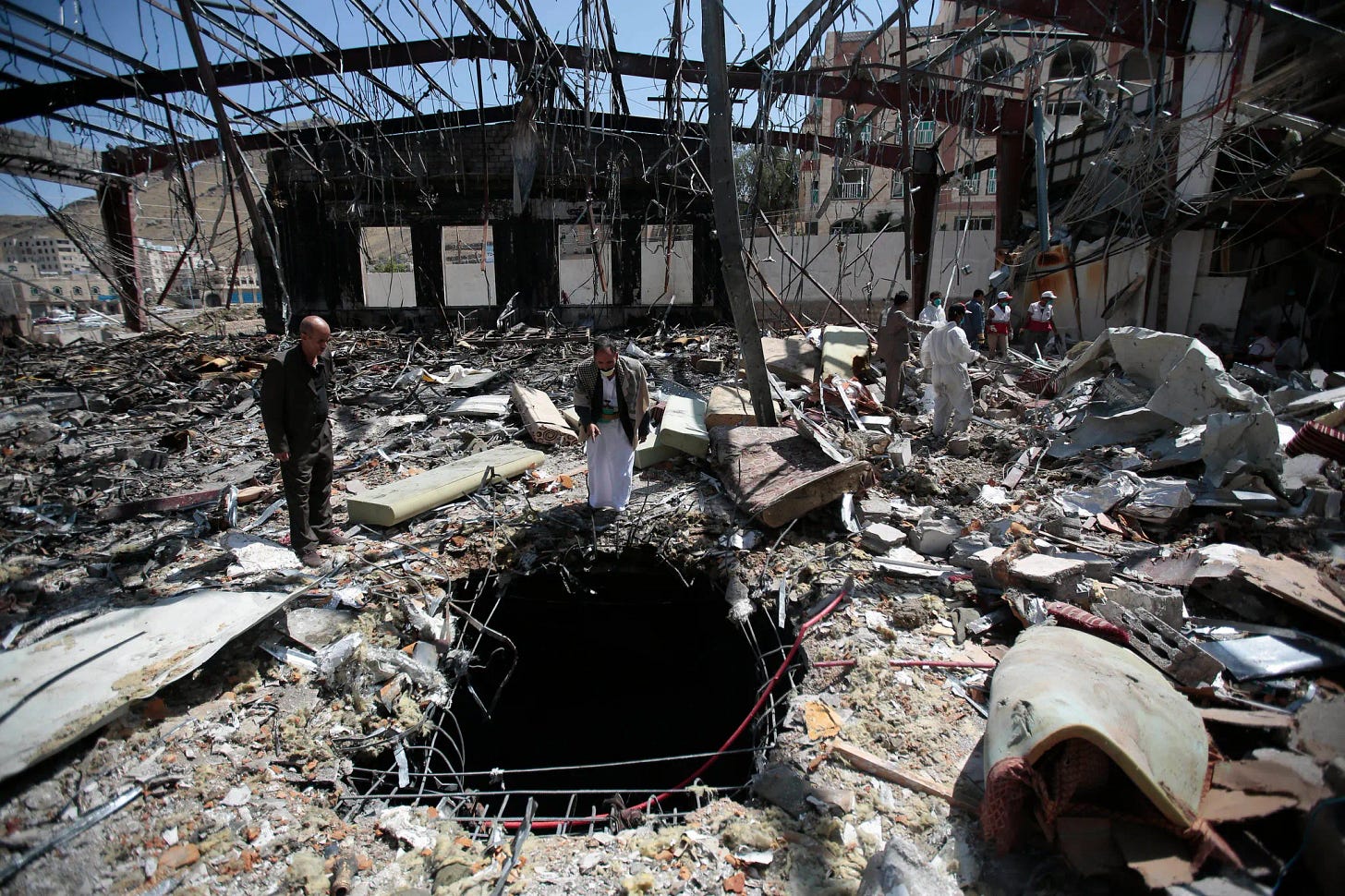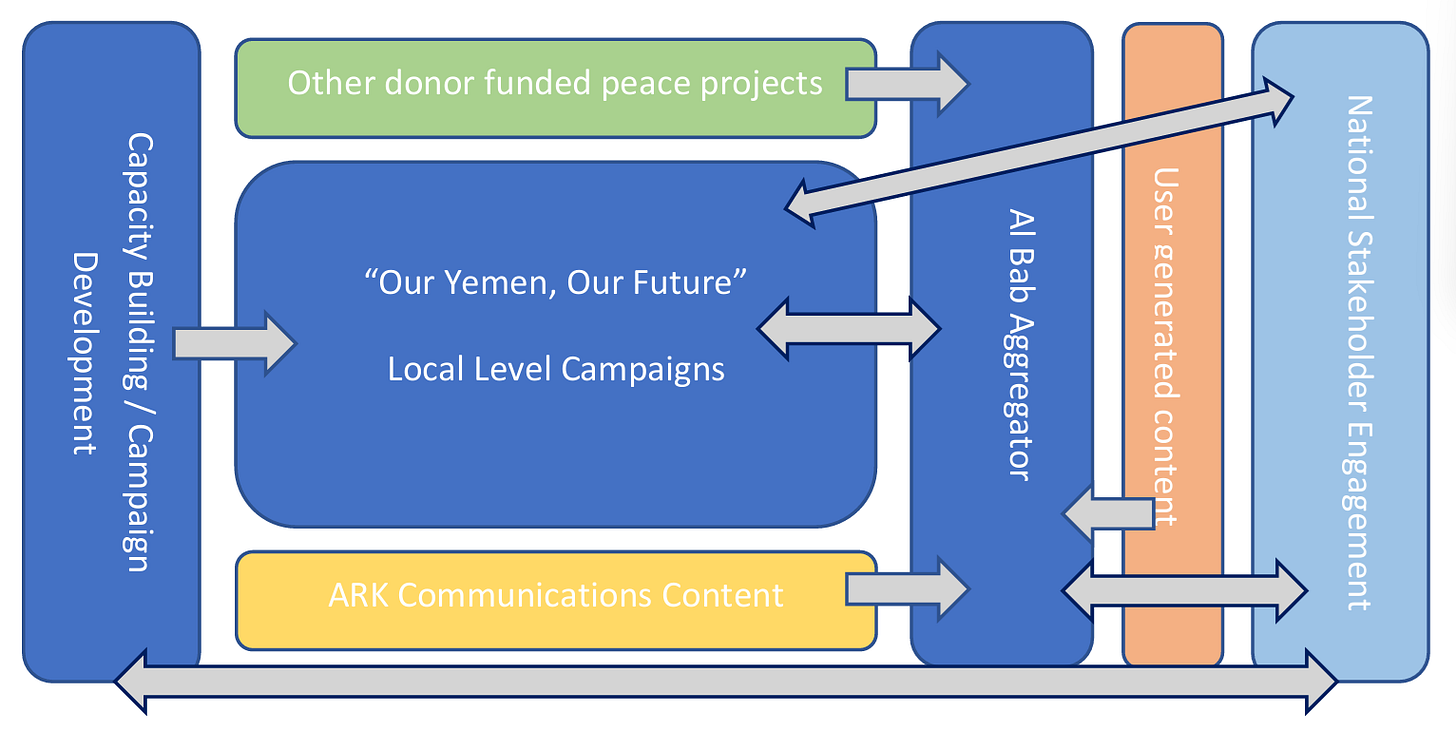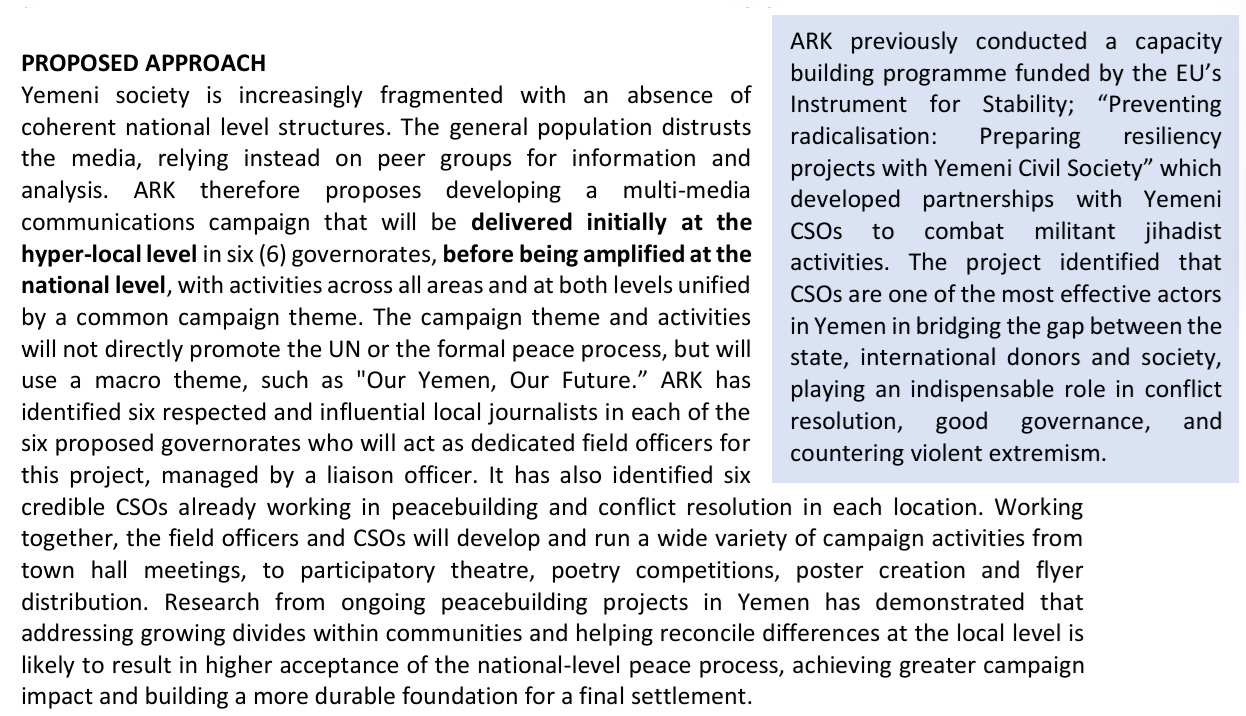All my investigations are free to access, thanks to the generosity of my readers. Independent journalism nonetheless requires investment, so if you took value from this article or any others, please consider sharing, or even becoming a paid subscriber. Your support is always gratefully received, and will never be forgotten. To buy me a coffee or two, please click this link.
On March 15th, Yemen was battered with airstrikes, described as a “wicked” act of Anglo-American aggression by spokespeople for AnsarAllah. The blitzkrieg, which overwhelmingly targeted residential areas, killed at least 31 civilians and injured over 100 more. In a characteristically bombastic outburst, US President Donald Trump declared the “decisive and powerful military action” was launched in response to “relentless assaults” on Western shipping and “American vessels.” He pledged Washington would continue to “use overwhelming lethal force until we have achieved our objective.”
That objective is of course to smash AnsarAllah’s anti-genocide blockade in the Red Sea, restarted March 11th due to the Zionist entity’s refusal to allow vital humanitarian aid into Gaza. It is a goal shared by Britain, which has eagerly abetted US military actions against AnsarAllah ever since October 7th, the pair conducting joint airstrikes on Yemen on five separate occasions in the first half of 2024. London was also one of few nations that actively participated in the embarrassingly failed, US-led Operation Prosperity Guardian.
Yet, Western news outlets have either omitted, or downplayed, Britain’s role in the latest burst of belligerence targeting Yemen. On March 16th, The Guardian reported US airstrikes against Sanaa “may continue for weeks”, making no reference to British involvement at all. Simultaneously, the BBC claimed outright London “did not participate” in the previous day’s bombing, but merely provided “routine refuelling support for the US.” There are strong grounds to disregard this diminution.
After all, a mass media omertà on Britain’s central - if not leading - role in the West’s long-running collective effort to crush AnsarAllah has effectively been in place ever since the Yemeni civil war erupted in late 2014. This is despite ample open source evidence - including statements made in parliament by government ministers - testifying to London’s outsized responsibility for the death and devastation that has been rained down on Sanaa almost without pause ever since.
The rationale for Britain’s interest in Yemen is obvious. On top of neutralising one of the most potent regional threats to its Israeli proxy post-October 7th, Saudi Arabia’s preceding genocidal, eight-year-long aerial intervention in the civil war represented an almost unprecedented bonanza for London’s arms industry. Moreover, these interrelated conflicts provided a golden opportunity to fulfil the long-held fantasy of restoring a British military presence “East of Suez”, following their 1967 ouster by Yemeni liberation forces.
‘Overwhelming Evidence’
In March 2015, Saudi Arabia, in coalition with several regional allies, launched a wide-ranging military intervention against Yemen aimed at restoring the rule of Abdrabbuh Mansur Hadi, displaced weeks earlier via a popular uprising led by AnsarAllah. It was not until January next year insinuations of intimate British involvement in Riyadh’s savage campaign began to trickle into the public domain. By that point, the predominantly air-focused effort had already claimed thousands of civilian lives, displaced millions, and produced what the UN dubbed a “humanitarian catastrophe”.

This trickle subsequently became a deluge. Yet, British officials rigidly stuck to the line that London was neither a member of the Saudi-led coalition, nor a party to the conflict, and simply sought a “sustainable political solution” to the war. In reality, Riyadh and its confederates were wholly reliant on London’s assistance for arms and training, and identifying airstrike targets. Over half of the equipment used in coalition bombing raids was British-supplied, including Tornado and Typhoon aircraft, Paveway bombs, and Brimstone and Stormshadow missiles.
Throughout Saudi Arabia’s intervention, Yemen was bombarded daily by British-made bombs - including internationally banned cluster munitions - dropped by British-made planes, flown by British-trained pilots. Once their destructive sorties were complete, these jets flew back to Riyadh to be repaired and serviced by British contractors, including Royal Air Force engineers. Chief among those contractors was BAE systems. Independent investigations calculated at least 6,200 employees of the company were posted to Saudi Arabia for the purpose. Receipts for this assistance ran into billions.
In June 2019, John Deverell, former British defence attache to Saudi Arabia and Yemen, told The Guardian that Riyadh’s mass murdering coalition “absolutely depend on BAE Systems,” and “they couldn’t do it without us.” The outlet also quoted an anonymous BAE Systems employee, who stated starkly that if the company ceased supporting the coalition’s attack on Yemen, “in seven to 14 days there wouldn’t be a jet in the sky.” The coalition lacked “the expertise” to use British weapons “to fight a sustained air war.”
The report was a vanishingly rare example of the mainstream media acknowledging that the genocidal assault on Yemen was a British war in everything but name. It revealed London’s sponsorship extended beyond the air campaign, with “an unknown number” of British soldiers joining coalition land forces in invading Sanaa and engaging in firefights with AnsarAllah. The Guardian also suggested arms exports to the coalition were illegal under both domestic and international law, given “overwhelming evidence” they were being used to commit industrial scale war crimes.
Investigations by Amnesty International and the Yemen Data Project found British-made weapons were systematically employed in strikes deliberately targeting civilians and civilian infrastructure, including camps for displaced citizens, funerals, hospitals, schools, and weddings. These arsenals were also used to purposefully target crops, farmland, and fishing vessels, in order to starve the population. Contrary to blanket media coverage generated by Amnesty International reports when “enemy” states are scrutinised, the mainstream remained silent on these disclosures. As a March 2020 probe by Declassified UK found:
“Very few articles describe the Yemen conflict for what it is, given the extent of the UK’s military role - a British war. The term ‘British war in Yemen’ [or variant phrases] yields no search results in the text of any article in the past five years…The closest results are one article in The Independent…written not by a journalist, but by opposition MP, Diane Abbott, and two in The Guardian.”
‘Humanitarian Position’
In a sick twist, while London was hard at work bombing and starving Yemenis to death, leaked documents indicate British intelligence was concurrently engaged in clandestine, multi-channel psychological warfare operations to compel those same civilians to reject AnsarAllah’s rule, and embrace a UN-endorsed, US-encouraged “peace deal” drawn up by Saudi Arabia. Under its non-negotiable terms, the popular Resistance movement would be forced to surrender and disarm, in return for the coalition’s military actions to cease and its crippling economic blockade of Sanaa being partially lifted.
The propaganda war was secretly conducted by ARK, a major British intelligence cutout led by an MI6 journeyman. Working via local NGOs and media organisations that “support UK objectives” to “communicate effectively with Yemeni citizens”, ARK conceived the creation of a range of “visually rich” content promoting Riyadh’s derisory “peace” plan. This was disseminated both on- and offline, targeting “different demographics, sects, and locations to ensure inclusivity,” and informed by intensive focus grouping and polling of Yemeni citizens.
Publicly, many of these propaganda products appeared to be the work of Tadafur - Arabic for “work collectively and unite” - an astroturf network of “well-known” and “respected and influential” local NGOs and journalists, constructed by ARK. Its overtly stated mission was to “resolve local level conflicts” and “unite local communities in their conflict resolution efforts.” Under the banner of slogans such as “Our Yemen, Our Future”, Tadafur convened “gender segregated poetry competitions using peace as a theme”, and “plays and town hall meetings.”
Online, ARK covertly managed a Facebook page called “Bab”, with tens of thousands of followers - all of whom were unaware the platform was in reality a British intelligence asset. Bab broadcasted slick propaganda “promoting the peace process,” including videos and images of “local peacebuilding initiatives” organised by ARK’s NGO and field officer nexus. “Campaign content [highlighted] tangible, real-life examples of compelling peacebuilding efforts that all Yemenis, regardless of their political affiliation, can relate to”:
“These will offer inspirational examples for others to emulate, demonstrating practical ways to engage with the peace process at a local level. Taken together, these individual stories form the broader campaign with a national message: Yemenis share a collective desire for a peaceful resolution to the conflict.”
Bab users would in turn be invited to submit their own “voxpops, short videos, or infographics”, demonstrating “support for the peace process,” to be “shared by the project and field teams through influential WhatsApp messaging groups, a key way of reaching Yemeni youth.” ARK’s “well-connected communications team” would then “strategically share packaged stories with broadcast media or key social influencers, or offer selected journalists exclusive access to stories.” The purpose was to “collectively be as ‘loud’ as partisan national political and military actors.”
Sinisterly, multiple passages in the leaked files refer to the urgent need to ensure there was no discernible connection between these propaganda initiatives and the Saudi “peace” plan. One passage refers to how campaign “themes and activities” would never “directly promote the UN or the formal peace process.” Another states concealing the operation’s agenda behind ostensibly independent civil society voices “minimizes the risk” that “outputs are perceived as institutional communications stemming from or directly promoting the UN.”
This effort failed, along with the Saudi-led coalition’s attempt to shatter AnsarAllah, and the Yemeni population’s spirit. Instead, the Resistance movement’s domestic support was only bolstered, due to mass outrage over the ruthless bombing campaign. Similar results were produced by Operation Prosperity Guardian, in which even the mainstream media admits AnsarAllah inflicted a historic defeat on the US Navy and Air Force. Whether Trump’s renewed hostilities will be more successful remains to be seen. But characteristically, AnsarAllah is not backing down. A spokesperson has declared:
“The Zionist entity has not adhered to the ceasefire agreement, so our naval operations target it alone with the aim of lifting the siege on Gaza. This is a moral and humanitarian position. America's involvement in the aggression against Yemen is unjustified and will result in a response. We will meet escalation with escalation, and the one who starts it is the most unjust.”











About 50 years ago, I wrote a paper on the developments and civil wars in what had been the British colonies on the South/West sides of Saudi Arabia at the end of their colonial era.
The late stage British Empire (and most particularly, the nexus of their secret services/"deep state"/diplomatic service) did some very ugly things in that part of the globe before throwing in the towel. The more things change, the more they stay the same-
Brilliant editorial...thank you Kit.
An unjust genocide on Palestinians and an unjust war on the Yemenis.
Disgraceful as for UK it's dying..............